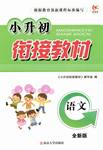题目内容
9. He is very ill. I am afraid he soon.
A. is going to die B. is to die
C. dies D. has been dead
9. A
9. A解析:句意:他病得很严重,恐怕很快就 要死了。“很快会死”是根据“病得很严重” 这一客观迹象得出的结论,故用be going to do形式表示将来意义。

练习册系列答案
 学而优衔接教材南京大学出版社系列答案
学而优衔接教材南京大学出版社系列答案 小学课堂作业系列答案
小学课堂作业系列答案
相关题目